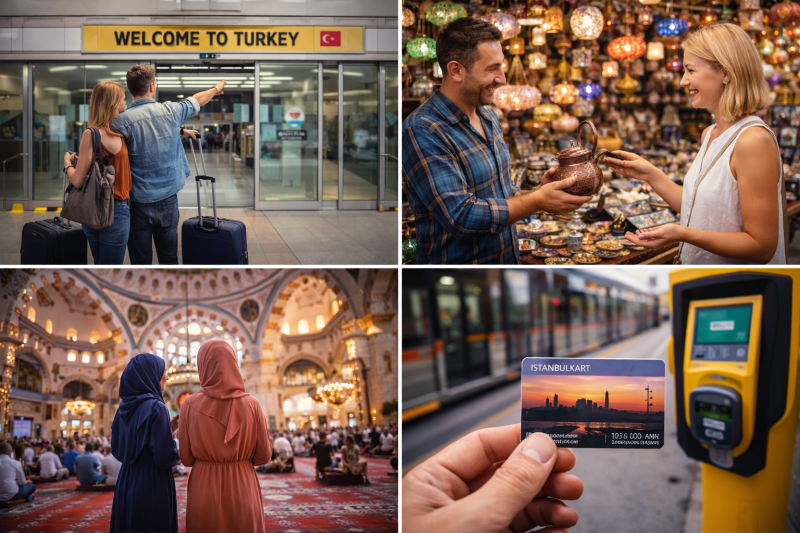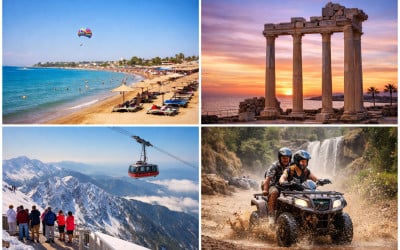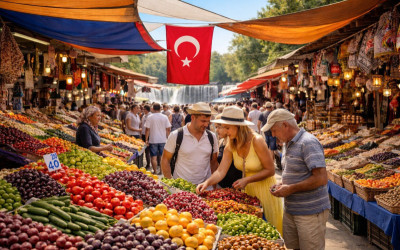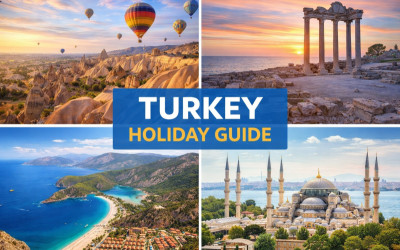Essential and Practical Travel Tips for Exploring Turkey
Turkey is a country of extraordinary beauty, rich history, and vibrant culture. However, beyond the well-known advice, there are lesser-discussed but equally important aspects that can make your trip smoother, safer, and more enjoyable. Here’s a guide with practical, real-world tips to help you navigate Turkey like a pro.
1. Understand the Local Time Zone
Turkey follows GMT+3 year-round without any daylight saving time changes. Unlike many countries that adjust their clocks seasonally, Turkey maintains a fixed time, which can sometimes lead to confusion for travelers. This is especially important when coordinating international flights, booking tours, or planning virtual meetings.
Tip: Double-check your flight times, hotel check-ins, and tour schedules to avoid any time zone-related mishaps. If you're traveling from a country that observes daylight saving time, be mindful that your home time difference with Turkey may change depending on the season. Consider setting a world clock on your phone to keep track.
2. Carry Both Cash and Card
While credit and debit cards are widely accepted in cities, hotels, and major restaurants, smaller businesses, rural areas, street vendors, and local markets often prefer cash. Some taxis, souvenir shops, and even family-run cafes may not accept card payments, so carrying cash ensures a smoother experience.
ATMs are widely available, but withdrawal fees can vary. Some ATMs, especially those in tourist-heavy areas, charge higher fees or offer poor exchange rates.
Advice: Use ATMs from major banks like İş Bankası, Ziraat Bankası, or Garanti BBVA to minimize fees and ensure secure transactions. Always carry small denominations of Turkish Lira for everyday purchases like bus fares, tips, and market shopping. If exchanging money, compare rates at banks or official exchange offices rather than at the airport for better deals.
3. Avoid Taxi Scams
In major cities like Istanbul, Ankara, and Antalya, taxi scams can be a common issue. Some drivers may take unnecessarily long routes, claim the meter is broken, or attempt to charge tourists inflated fares. In some cases, drivers may even try to switch banknotes when giving change, pretending you handed them a smaller bill.
Solution: Use ride-hailing apps like BiTaksi or Uber for fair pricing and secure transactions. If you must take a regular taxi:
- Choose official taxis from designated taxi stands rather than hailing one off the street.
- Ensure the meter is running before the trip begins. If the driver refuses, find another taxi.
- Know the approximate fare for your route beforehand to avoid overcharging.
- Pay in exact change when possible to prevent note-switching tricks.
For a hassle-free experience, hotels and restaurants can often call a reliable taxi for you.
4. Be Mindful of Tap Water
While tap water in Turkey is safe for hygiene purposes like brushing your teeth and washing fruits or vegetables, it is not recommended for drinking due to variations in water quality across different regions. Many locals and tourists prefer bottled water to avoid potential stomach discomfort.
Extra Tip: Instead of buying small bottles from tourist hotspots, purchase larger bottles or multi-packs from supermarkets for better value. Many hotels and accommodations provide complimentary bottled water, so take advantage of this when available. If you're staying for an extended period, consider using a reusable bottle with a built-in filter for added convenience.
5. Paid Plastic Bags in Supermarkets
In Turkey, plastic bags are not free in supermarkets, grocery stores, and many retail shops. This is part of an environmental initiative to reduce plastic waste. Each plastic bag costs 25 Kuruş (0.25 TL).
Tip:
- Bring a reusable shopping bag or backpack to avoid extra charges.
- If you forget your bag, you can buy a durable reusable bag at most supermarkets.
- Not only will you save money, but you will also contribute actively to environmental protection.
With these tips, your trip to Turkey will be more comfortable, safer, and cost-effective.
6. Use Public Transportation
In large cities like Istanbul, Ankara, and Izmir, public transportation is well-developed, affordable, and often faster than taxis, especially during rush hours. The system includes buses, trams, subways, and ferries, all of which require rechargeable transport cards.
Examples of transport cards:
- Istanbulkart – for buses, subways, trams, and ferries in Istanbul.
- Ankarakart – for public transportation in Ankara.
- İzmirim Kart – for public transport in Izmir.
Tip:
- Buy an Istanbulkart right after your arrival at the airport or at a metro station to avoid long lines later.
- A single card can be used by multiple passengers, making it especially convenient for families and groups.
- Public transport not only saves you money but also allows you to move around the city like a local, without the need to take overpriced taxis.
7. Be Prepared for Different Climates
Turkey has a wide variety of climates that can differ greatly depending on the region:
- Antalya and Bodrum are warm and humid,
- Cappadocia and Pamukkale can be particularly cool in the evenings,
- In winter, Istanbul and Ankara can get cold, while the eastern regions may experience heavy snowfall.
Tip:
- Wear light clothing during the day, but bring a jacket or sweater for the evenings.
- If you're visiting Cappadocia, dress in layers, especially if you're planning to take an early morning hot air balloon ride.
8. Respect Local Dining Habits
Turkish cuisine is very diverse, and in local restaurants, you can often find more authentic and affordable dishes than in tourist-oriented spots. However, some traditional restaurants, especially small family-run establishments, may not have written menus or clear price listings, particularly in seafood restaurants.
Tip:
- Always ask for the price before ordering, especially in seafood restaurants, as prices are often listed per kilogram rather than per portion.
- Avoid overpriced tourist restaurants and dine where the locals eat – the quality is often better, and the prices are fairer.
Turkish Coffee and Tea Culture
Turkey has a rich coffee and tea culture that is deeply embedded in its traditions and daily life. These beverages are not only a part of daily routines but also symbolize hospitality and social gatherings. Both Turkish coffee and tea offer a cultural experience that is unique to this region.
Turkish Coffee:
Turkish coffee is a beverage with a long cultural heritage, recognized by UNESCO as an intangible cultural heritage. It is made by finely ground coffee, water, and sugar cooked together in a special coffee pot called a cezve. The coffee is served in small cups, and drinking it is an essential cultural ritual.
- Serving: The coffee is traditionally served in a small, porcelain cup. It can be made without sugar, with a little sugar, or with full sugar, depending on personal preference. Despite the small size of the cup, it is incredibly rich and full of flavor.
- Coffee Grounds: After drinking Turkish coffee, you will notice coffee grounds (called telve) left at the bottom of the cup. These grounds are not drunk, as it is part of the tradition to leave them behind. The coffee grounds are also used for a fun and popular activity called Turkish coffee fortune telling (kahve falı), which is a social and entertaining experience where one can interpret the patterns left by the coffee grounds to predict the future.
Turkish Tea:
In Turkey, tea is an indispensable part of daily life. Turkish tea is typically made from black tea leaves and served hot and strong. It is enjoyed throughout the day, with social gatherings, conversations, and even business meetings often accompanied by tea. The tea is served in small, tulip-shaped glasses, which helps maintain the warmth of the tea for longer periods.
- Tea Drinking Tradition: Tea is an integral part of Turkish life, and it is consumed several times a day. Whether in homes, offices, or cafes, tea is always present. It is an essential part of Turkish hospitality; offering tea to guests is a sign of respect and welcome.
- Free Tea: In Turkey, tea is often served for free, especially in small shops, markets, and restaurants. This is a symbol of the Turkish culture of generosity and hospitality.
Extra Information:
- Coffee Fortune Telling: After finishing your Turkish coffee, the remaining grounds are used for fortune telling. The patterns left in the cup are said to reveal the future, and this practice is a fun and engaging activity among friends and family.
- Tea Offering: After finishing one cup of tea, it is common to say "bir çay daha" (another tea, please) when offered another cup, as Turkish people love their tea, and offering a second cup is a sign of politeness and generosity.
Both Turkish coffee and tea go beyond just being beverages; they are symbols of hospitality, social connections, and daily rituals. These drinks create a welcoming atmosphere, foster conversations, and provide an authentic cultural experience that defines Turkish life.
9. Be Cautious at Crosswalks
Although Turkish traffic laws give priority to pedestrians, drivers do not always stop at crosswalks, especially in busy cities like Istanbul. Some intersections have pedestrian lights, but in many areas, cars may not yield even if you have the right of way.
Advice: Use pedestrian crossings with traffic lights whenever possible and always double-check before stepping into the road. In high-traffic areas, follow local pedestrians, as they often know the safest way to cross. If you're driving in Turkey, be extra vigilant at crosswalks and intersections.
10. Learn Basic Turkish Phrases
While English is widely spoken in tourist areas, learning a few basic Turkish phrases can make interactions smoother, especially in local markets, family-run restaurants, and rural areas. Even a simple greeting in Turkish is appreciated by locals.
Here are some useful phrases along with their English meanings and pronunciations:
- Merhaba – Hello (mehr-hah-bah)
- Teşekkür ederim – Thank you (teh-shehk-kur eh-deh-reem)
- Ne kadar? – How much? (neh kah-dahr?)
- Lütfen – Please (loot-fehn)
- Hesabı alabilir miyim? – Can I get the bill, please? (heh-sah-buh ah-lah-bee-leer mee-yeem?)
Note: While "Hesap lütfen" (heh-sahp loot-fehn) is commonly understood, it is a bit informal. A more polite way to ask for the bill is "Hesabı alabilir miyim?", which is how most locals would phrase it in restaurants.
Even if your pronunciation is not perfect, locals appreciate the effort and are more likely to respond warmly!
10. Learn Basic Turkish Phrases
While English is widely spoken in tourist areas, learning a few basic Turkish phrases can make interactions smoother, especially in local markets, family-run restaurants, and rural areas. Even a simple greeting in Turkish is appreciated by locals.
Here are some useful phrases along with their English meanings and pronunciations:
- Merhaba – Hello (mehr-hah-bah)
- Teşekkür ederim – Thank you (teh-shehk-kur eh-deh-reem)
- Ne kadar? – How much? (neh kah-dahr?)
- Lütfen – Please (loot-fehn)
- Hesabı alabilir miyim? – Can I get the bill, please? (heh-sah-buh ah-lah-bee-leer mee-yeem?)
Note: While "Hesap lütfen" (heh-sahp loot-fehn) is commonly understood, it is a bit informal. A more polite way to ask for the bill is "Hesabı alabilir miyim?", which is how most locals would phrase it in restaurants.
Even if your pronunciation is not perfect, locals appreciate the effort and are more likely to respond warmly!
11. Stay Safe in Crowded Areas
Bustling areas like bazaars, metro stations, and major tourist attractions can attract pickpockets. While Turkey is generally safe, petty theft can occur in busy spots where tourists are distracted.
Tip: Use a crossbody bag with zippers, keep valuables in front-facing pockets, and avoid carrying large amounts of cash. Be especially cautious on public transport and in marketplaces, where thieves often target unaware travelers.
12. Understand Museum Fees and Discounts
Most museums and historical sites in Turkey require an entry fee, and individual ticket costs can add up quickly if you plan to visit multiple locations. Fortunately, the Museum Pass offers significant savings and faster entry at major attractions.
Suggestion: Research regional Museum Pass options based on your itinerary, as they vary by location and validity period. For example, the Istanbul Museum Pass covers major sites like Topkapı Palace and Hagia Sophia, while the Turkey Museum Pass grants access to numerous landmarks across the country.
13. Don’t Underestimate the Power of Turkish Hospitality
Turkish culture is renowned for its hospitality, and locals are often eager to help visitors. You might be invited for tea in a shop or receive friendly assistance when asking for directions. However, in touristy areas, some vendors may use friendliness as a sales tactic.
Advice: Trust your instincts and feel free to decline politely if an offer makes you uncomfortable. A simple “Hayır, teşekkürler” (No, thank you) is enough if you’re not interested.
14. Medical and Pharmacy Access
Pharmacies (eczane) in Turkey are well-stocked, and many over-the-counter medications can be purchased without a prescription. However, some brand names may differ from those in your home country.
Preparation: Bring a supply of any essential medication, and carry a list of active ingredients in case you need to find a local alternative. Pharmacies are generally open Monday to Saturday, with emergency on-duty pharmacies available on Sundays and late nights.
In tourist areas like Side and its surroundings, pharmacies are open every day from 9:00 AM to 11:30 PM. Pharmacies that are closed will display the name and address of the on-duty pharmacy on their window.
15. Environmental Awareness at Landmarks
Turkey’s UNESCO World Heritage Sites and natural wonders require careful preservation. From the delicate travertines of Pamukkale to the eroded fairy chimneys of Cappadocia, excessive contact and off-path exploration can cause permanent damage.
Golden Rule: Always stick to designated paths, avoid touching fragile rock formations, and follow conservation guidelines at historical sites. Being mindful of the environment ensures that these breathtaking locations remain intact for future generations.
Final Thoughts
Turkey is a country that offers an extraordinary blend of history, culture, and natural beauty, making it a destination unlike any other. From the bustling streets of Istanbul, filled with rich historical landmarks like Topkapi Palace and Hagia Sophia, to the fairy-tale landscapes of Cappadocia, with its surreal rock formations and hot air balloon rides, every corner of this country has something unique and captivating to offer.
Whether you are exploring the ancient ruins of Ephesus, relaxing on the sunny beaches of Antalya, or experiencing the vibrant culture of Izmir, Turkey promises a diverse range of experiences that will leave you with unforgettable memories.
Turkey also boasts natural wonders, such as Pamukkale’s terraces or the olive groves of Aegean villages. With more than 4000 years of history and a cultural mix that blends East and West, the country offers visitors an experience like no other.




